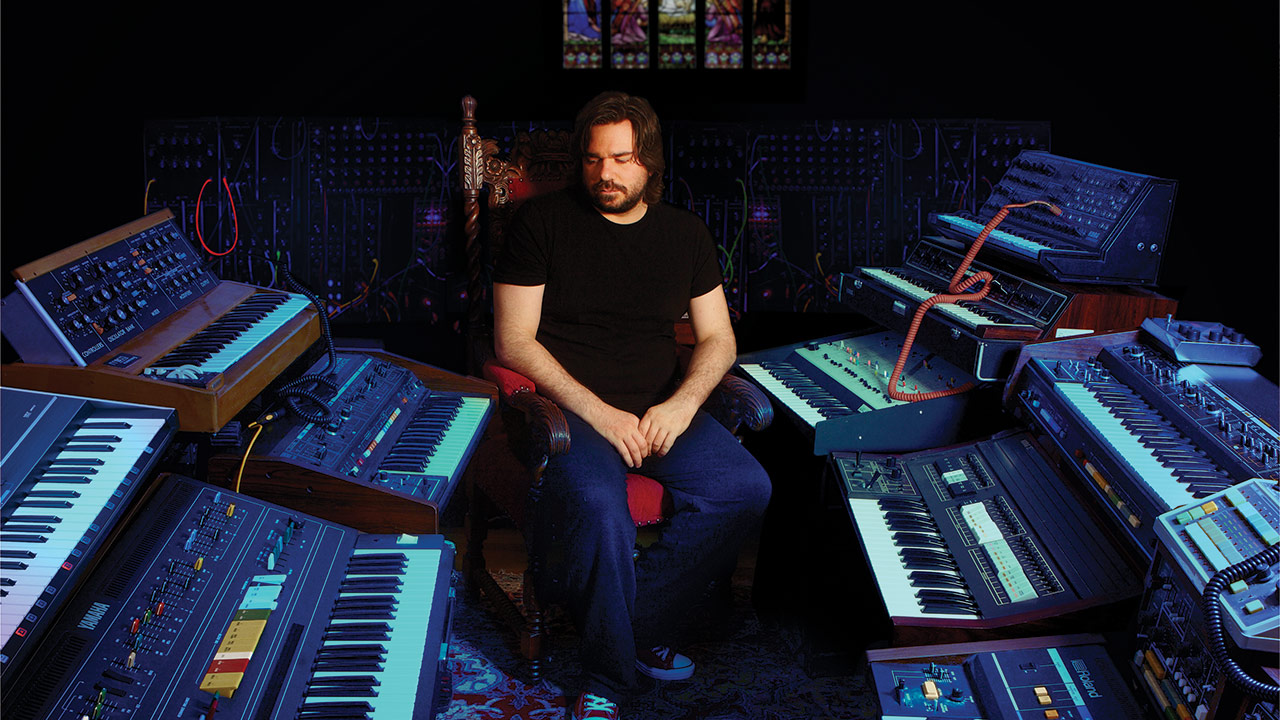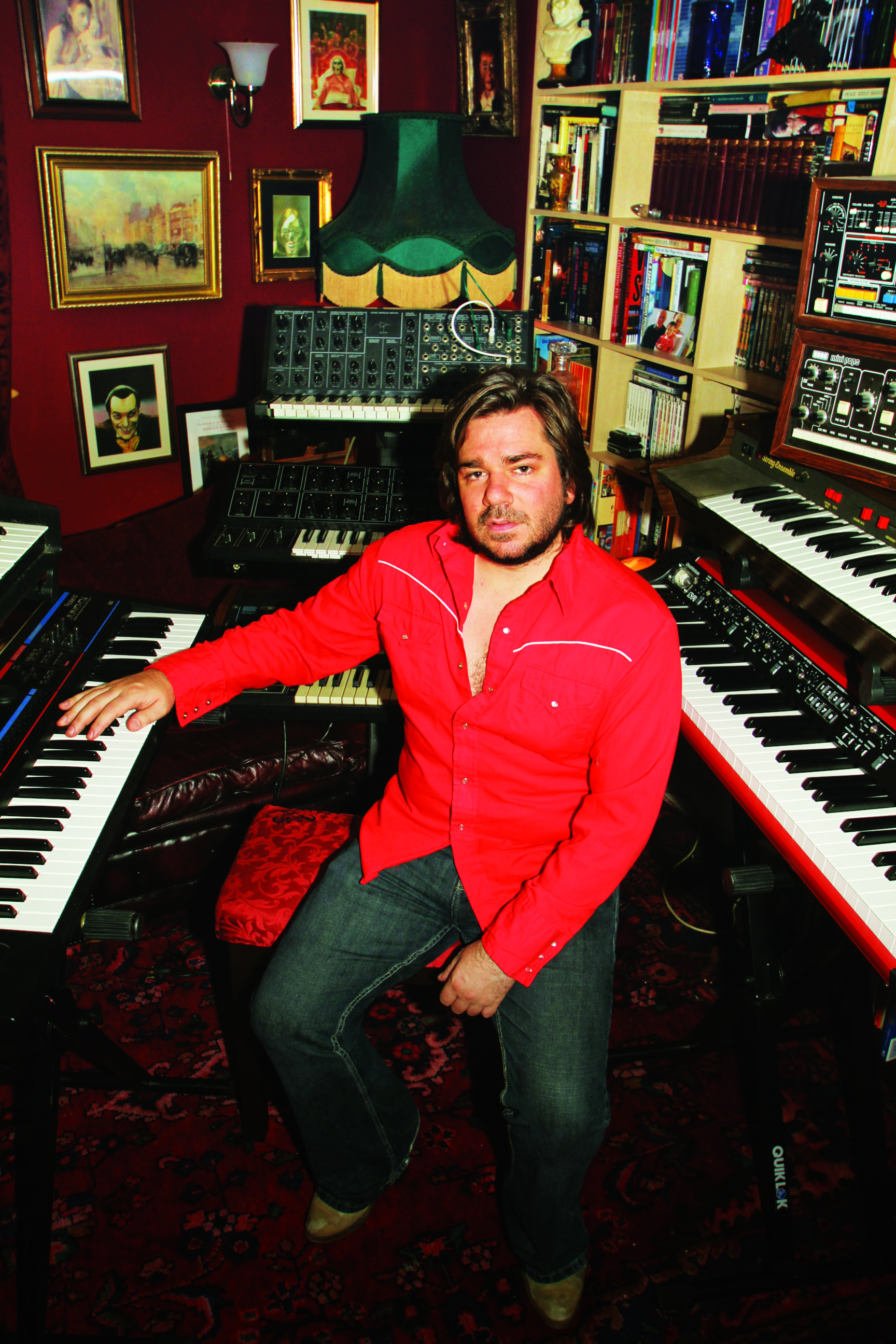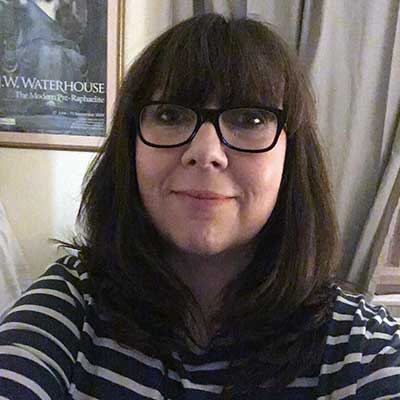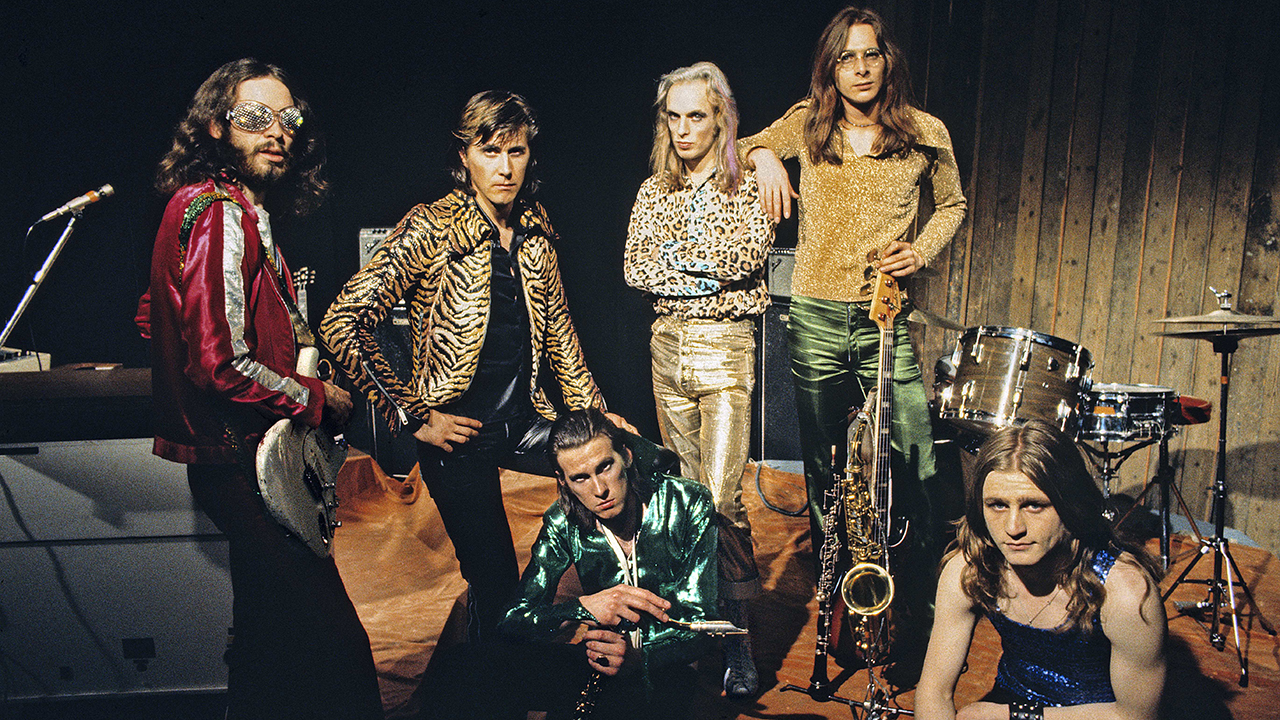Inside Matt Berry's Record Collection
Toast Of London star Matt Berry is a fan of Jean Michel Jarre, Mike Oldfield, Pink Floyd and more

It all began with Top Of The Pops. I was young and impressionable at a time in pop music when everyone was playing synths – analogue synths like these [see Matt’s collection, pictured above]. I thought this was interesting because these instruments didn’t look like anything I knew, not like anything at school, for instance. So I became obsessed with anything that had a synth on it and wanting to play synth.
“The first synth album for me that cut through is Équinoxe by Jean Michel Jarre. Look at that sleeve, he looks cool! I first heard Jarre when I was about 10 years old through one of these cheap instrumental albums that would have versions of Crockett’s Theme and stuff on. The one I had was a bit more upmarket and had original versions. Équinoxe was on it and blew my mind cos I hadn’t heard anything like that before. The whole thing was unashamedly synth from the bottom up – drums, everything. I thought it was great.
“So Équinoxe lead me to Oxygène, which is the better album, and of interest because of the lack of decent sequencers at the time, but it still sounds fantastic.
“These albums came out just before things become digital, and go towards a more sophisticated approach and million miles away from this [holds up Switched On Bach] which I like, but synths were just fun-toys then [also picks out synth showcase album The World Of Elka]. At this time Jarre was serious, no gimmicks. I would pore over the album sleeves as all the equipment was listed, all the synth names sounded like things from outer space and fired my imagination.
“Mike Oldfield came just after Jarre. The approach is kind of the same, but with Oldfield he’s meticulous about recording every single note himself – as a self-taught musician I identify with that. But this [vinyl box set of Tubular Bells, Hergest Ridge and Ommadawn] is amazing to me because of the atmospheres. Mike was using traditional instruments to paint pictures with the different sounds. Tubular Bells is his clearest vision and very personal to him, you can tell. He’s like a fine artist who who just wants to deliver his work and be left alone, but Jarre had an ego and became all about lasers and the circus, eventually.“My mum bought me a lot of my early records – like my first album, Queen’s Flash Gordon soundtrack – but no-one in my house was interested in the music I liked. Then I heard my older sister playing Roxy Music, and I totally got the bug – For Your Pleasure is my absolute favourite. With Roxy, I love what Brian Eno was doing, the structure of the songs, the long introductions, or when they have things in two parts. I still listen to him today. I’m a big fan of Bryan Ferry too – he wasn’t a trained musician either and wrote music in a completely weird way – but I’m not interested in his later covers albums.
“My next big album was Jesus Christ Superstar [original version, 1969]. This isn’t just a musical, this is legit rock music. The bass player, Alan Spenner, does some of the best bass work I’ve heard, and this has inspired my songwriting, no doubt. I’ve got loads of versions of it, even one in French. And this was how I discovered Ian Gillan and Deep Purple. …In Rock and Machine Head stand out and I really like them because of the Hammond organ, of course. Jon Lord is incredible! I just love the sound of 70s style recordings and these albums typify that.
“I used to go to a lot of record fairs, there was one near me in Bedford about once every two months. I’d spend the whole day there. That’s where I saw albums for the first time and in real life. Like, if I had a book on David Bowie and it had a picture of David Live, I couldn’t buy that in my local Our Price. So I’d go to a record fair and find it for a few quid.
Sign up below to get the latest from Prog, plus exclusive special offers, direct to your inbox!
“I was freaked out by Bowie. And I was completely petrified by Kate Bush singing Wuthering Heights on TV. Anyone I was scared of I was interested by so I followed them and bought their records, once I got the balls. I saw these amazing creatures and I’d think, I want to hear that, that’s not a pop song! With Kate, I’d pick The Kick Inside, Never Forever and Lionheart for these brilliant, rustic atmospheres that I like. Hounds Of Love is good, but too 80s for me, everything overproduced.
“I knew what prog was by this time and was impressed by Pink Floyd – David Gilmour is an amazing guitarist, the way he channels blues and funk in totally unique, understated way – and by Rick Wakeman and ELP, definitely because of the amount of synth and types of synth they use. With Rick and ELP, I could hear whole albums of analogue synth played really well, a good thing in my book!
“But oppositely, can Gary Numan be termed progressive? It’s all about his simplicity and bold strikes of the keyboard. His minimalism is as important to me as Rod Argent or Ray Manzarek. Numan can fill speakers as much as Jon Lord but in a totally different way.
“New prog has to have a foot in prog and a foot somewhere else. Albums like OK Computer pushed it forward and Jarre and Eno have kept the sound from the past but use the most up-to-date equipment. With mod, or rock’n’roll, you can still keep that look going but you can’t with prog. No-one wants to see capes these days. Anyone dressing like that now would be sending it up, wouldn’t they?
“What I like about all of these artists is that they’ll have a song on an album which is eight, nine minutes long, something a bit different. I like pop music but I haven’t got such a short attention span where I only need a three-minute burst. That’s where these artists come in!”
- Best record players: turntables your vinyl collection deserves
- Smaller budget? No problem! These are the best budget turntables
“My mum bought me a lot of my early records – like my first album, Queen’s Flash Gordon soundtrack – but no-one in my house was interested in the music I liked. Then I heard my older sister playing Roxy Music, and I totally got the bug – For Your Pleasure is my absolute favourite. With Roxy, I love what Brian Eno was doing, the structure of the songs, the long introductions, or when they have things in two parts. I still listen to him today. I’m a big fan of Bryan Ferry too – he wasn’t a trained musician either and wrote music in a completely weird way – but I’m not interested in his later covers albums.
“My next big album was Jesus Christ Superstar [original version, 1969]. This isn’t just a musical, this is legit rock music. The bass player, Alan Spenner, does some of the best bass work I’ve heard, and this has inspired my songwriting, no doubt. I’ve got loads of versions of it, even one in French. And this was how I discovered Ian Gillan and Deep Purple. …In Rock and Machine Head stand out and I really like them because of the Hammond organ, of course. Jon Lord is incredible! I just love the sound of 70s style recordings and these albums typify that.
“I used to go to a lot of record fairs, there was one near me in Bedford about once every two months. I’d spend the whole day there. That’s where I saw albums for the first time and in real life. Like, if I had a book on David Bowie and it had a picture of David Live, I couldn’t buy that in my local Our Price. So I’d go to a record fair and find it for a few quid.
“I was freaked out by Bowie. And I was completely petrified by Kate Bush singing Wuthering Heights on TV. Anyone I was scared of I was interested by so I followed them and bought their records, once I got the balls. I saw these amazing creatures and I’d think, I want to hear that, that’s not a pop song! With Kate, I’d pick The Kick Inside, Never Forever and Lionheart for these brilliant, rustic atmospheres that I like. Hounds Of Love is good, but too 80s for me, everything overproduced.
“I knew what prog was by this time and was impressed by Pink Floyd – David Gilmour is an amazing guitarist, the way he channels blues and funk in totally unique, understated way – and by Rick Wakeman and ELP, definitely because of the amount of synth and types of synth they use. With Rick and ELP, I could hear whole albums of analogue synth played really well, a good thing in my book!
“But oppositely, can Gary Numan be termed progressive? It’s all about his simplicity and bold strikes of the keyboard. His minimalism is as important to me as Rod Argent or Ray Manzarek. Numan can fill speakers as much as Jon Lord but in a totally different way.
“New prog has to have a foot in prog and a foot somewhere else. Albums like OK Computer pushed it forward and Jarre and Eno have kept the sound from the past but use the most up-to-date equipment. With mod, or rock’n’roll, you can still keep that look going but you can’t with prog. No-one wants to see capes these days. Anyone dressing like that now would be sending it up, wouldn’t they?
“What I like about all of these artists is that they’ll have a song on an album which is eight, nine minutes long, something a bit different. I like pop music but I haven’t got such a short attention span where I only need a three-minute burst. That’s where these artists come in!”

Jo is a journalist, podcaster, event host and music industry lecturer who joined Kerrang! in 1999 and then the dark side – Prog – a decade later as Deputy Editor. Jo's had tea with Robert Fripp, touched Ian Anderson's favourite flute (!) and asked Suzi Quatro what one wears under a leather catsuit. Jo is now Associate Editor of Prog, and a regular contributor to Classic Rock. She continues to spread the experimental and psychedelic music-based word amid unsuspecting students at BIMM Institute London and can be occasionally heard polluting the BBC Radio airwaves as a pop and rock pundit. Steven Wilson still owes her £3, which he borrowed to pay for parking before a King Crimson show in Aylesbury.

